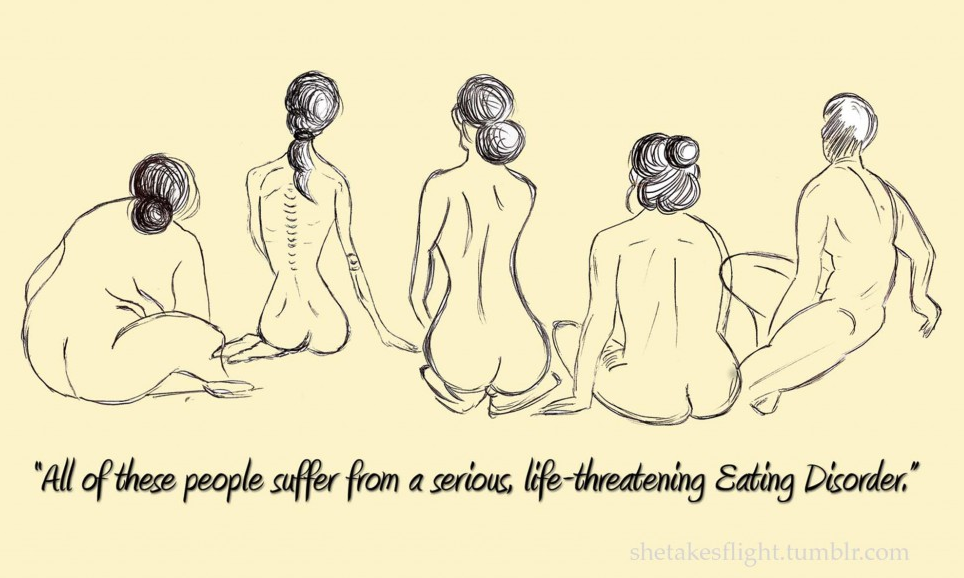Communicating effectively with a loved one recovering from an eating disorder is often challenging and frustrating. Due to decreased confidence, lowered self-esteem, malnourishment, hypersensitivity, and  eating disorder cognitions, comments intended to encourage and support are frequently distorted and misinterpreted. Below are three lists regarding communication. The first is a series of things that have frequently been said to me by well-meaning individuals, and how I have misconstrued them. I am sure I am not alone in my experience and hope that in sharing them with you, you might gain some insight into how well-intentioned comments might be interpreted. The second list is comprised of some general guidelines to help you avoid conversational pitfalls and gain greater insight into your loved one’s experience. At this point, you may be like my parents and asking, ‘What CAN I say or do then???? What won’t she misinterpret?’. This leads me to the third list which is a collection of things that might assist you in communicating in a supportive way. Please note, that what I share here is from my experience, and although I am sure there are commonalities, it is important to remain mindful that the experience of living with and recovering from an eating disorder is unique for each person.
eating disorder cognitions, comments intended to encourage and support are frequently distorted and misinterpreted. Below are three lists regarding communication. The first is a series of things that have frequently been said to me by well-meaning individuals, and how I have misconstrued them. I am sure I am not alone in my experience and hope that in sharing them with you, you might gain some insight into how well-intentioned comments might be interpreted. The second list is comprised of some general guidelines to help you avoid conversational pitfalls and gain greater insight into your loved one’s experience. At this point, you may be like my parents and asking, ‘What CAN I say or do then???? What won’t she misinterpret?’. This leads me to the third list which is a collection of things that might assist you in communicating in a supportive way. Please note, that what I share here is from my experience, and although I am sure there are commonalities, it is important to remain mindful that the experience of living with and recovering from an eating disorder is unique for each person.
Misinterpreted Comments
 Commenting on my weight, shape, size, or appearance. Please refrain from all comments on how I look – I am already exceedingly aware and critical of my body. Comments such as ‘You look so much healthier/better now!’ are interpreted as ‘You look so much fatter now!’. ‘Healthy’ may seem like a positive adjective, but to me it is rarely interpreted in the way it is intended. Comments such as ‘You’ve lost so much weight, you look great!’ are also inappropriate as this often fuels my eating disorder.
Commenting on my weight, shape, size, or appearance. Please refrain from all comments on how I look – I am already exceedingly aware and critical of my body. Comments such as ‘You look so much healthier/better now!’ are interpreted as ‘You look so much fatter now!’. ‘Healthy’ may seem like a positive adjective, but to me it is rarely interpreted in the way it is intended. Comments such as ‘You’ve lost so much weight, you look great!’ are also inappropriate as this often fuels my eating disorder.- ‘You look sickly/unhealthy/pale/gaunt/etc’. Whilst often shared out of concern, I used to equate ‘unhealthy’ with ‘thinner’ and looking unwell as a signifier of my success in restricting or starving. Such comments are often taken as a compliment and further fuel the eating disorder. It is recommended that any reference to size, shape, weight or appearance be avoided.
- ‘I wish I had the willpower to be anorexic. What are some tips you can give me on losing weight rapidly?’. Please do not ask for diet advice. Eating disorders are not a game or a quick fix diet. They are deadly disorders.
- Hearing my family or friends comments about their own weight, size, shape, appearance or diet, e.g. ‘I need to lose weight!’, ‘I’ve gained x kgs since …..’, ‘I ate sooo much yesterday that I just wanted to throw up’, ‘I skipped a few meals today…I’m absolutely starving!’ etc, has been generally unhelpful.
- Commenting on or criticising others’ food choices or appearance, e.g. ‘Look at her…she’s so thin/fat/ugly/pretty!’ often results in me comparing myself and this never ends well.
- ‘You don’t look like you have an eating disorder’, ‘Your eating disorder must not be that serious as you are not significantly underweight’, ‘You don’t look that ill’, ‘I thought you had to be thin to have an eating disorder’, etc. Individuals with eating disorders are not always underweight. More often than not, you cannot tell whether a person has an eating disorder merely by looking at them. The severity of their eating disorder is not dictated by their weight. A person can be extremely ill or malnourished whilst maintaining a normal or above normal weight. Furthermore, telling a sufferer that they aren’t thin is often interpreted as ‘you’re fat’.
General Guidelines
 Avoid using numbers – that includes calorie counting, clothing sizes, weights, measurements etc. Individuals with eating disorders are frequently consumed by numbers and recovery necessitates that they relinquish that fixation.
Avoid using numbers – that includes calorie counting, clothing sizes, weights, measurements etc. Individuals with eating disorders are frequently consumed by numbers and recovery necessitates that they relinquish that fixation.- Be alert to conversation traps such as the reassurance trap, e.g. ‘I won’t get fat will I?’, ‘Does this make me look fat?’, ‘Is it safe or acceptable to eat this?’, ‘Do you think I’m gross, disgusting or fat for eating this?’ etc. Such questions are reflective of ‘eating disorder talk’ and often arise out of high anxiety levels. Providing constant reassurance places the focus back on the external rather than the underlying issues; can become quite wearisome for the support person; alleviates the fear or anxiety only temporarily; and does not allow the individual to develop other strategies for dealing with anxiety, thoughts and fears, increasing their dependency upon others for anxiety reduction and reassurance. Instead, perhaps help the individual to identify when the ‘eating disorder voice’ is talking and respond from this basis. Merely stating, ‘I don’t want to respond to that’ when someone asks for example, if they are fat, will automatically be interpreted as ‘yes’.
- Do not label food as ‘healthy’ or ‘unhealthy’, ‘good’ or ‘bad’ – food has no moral value and it is all about balance. Individuals with eating disorders commonly struggle with black-and-white thinking and labelling food merely reinforces the person’s ideas about what are ‘safe’ and ‘unsafe’ foods. Recovery involves moving beyond this and accepting and feeling safe with a variety of foods.
- Refrain from commenting on what the individual is eating. Eating in front of others is often one of their greatest fears and making remarks about what they eat – either negative or positive reinforces the fear that everyone is watching and judging. Furthermore, comments such as ‘Wow, you ate a lot at that meal…well done!’, although intended as an encouragement, is frequently interpreted as ‘Wow, you ate a lot…and by a lot, I mean too much’.
- Avoid giving simple solutions such as, ‘Just eat and avoid and you’ll be fine’, ‘Why don’t you just eat?’, ‘Just eat a healthy diet and you won’t get fat’, ‘If you just stop puking, everything would be fine’, ‘Why can’t you just apply the willpower and determination you show in restricting to recovery?’, etc. To the non-sufferer, the concept that someone is unable to nourish their bodies with adequate food seems beyond understanding and illogical. Many people with eating disorders are however, exceedingly intelligent and competent in all other areas of their lives and if such a simple solution was viable, they would have never developed an eating disorder or would have already employed such strategies and be walking steadily in recovery. Remember, eating disorders are not just about food but arise from a complex matrix of genetic susceptibility, neurobiological abnormalities, cultural and social pressures, and physical and emotional stressors.
- Just because the eating disordered behaviours have diminished or the individual appears to be eating ‘normally’, do not assume the person is recovered. Eating disorders are not about food and eating, but are maladaptive coping mechanisms used to deal with low self-esteem, depression, feelings of inadequacy, fear, anxiety, perfectionism, and other emotions. Although relinquishing eating disordered behaviours is essential to recovery, it may take some time until cognitions are altered and new neural pathways and synapses are established in the brain.
Positive Examples
 ‘I don’t really know what the right thing to say or do is, but I’m here to listen and support you in any way I can’. There is no ‘perfect’ or ‘correct’ thing to say. Just as you cannot expect the individual to ‘do’ recovery perfectly, they will not expect you to be perfect in your support. It is important to be honest, willing to learn, and keep the lines of communication open.
‘I don’t really know what the right thing to say or do is, but I’m here to listen and support you in any way I can’. There is no ‘perfect’ or ‘correct’ thing to say. Just as you cannot expect the individual to ‘do’ recovery perfectly, they will not expect you to be perfect in your support. It is important to be honest, willing to learn, and keep the lines of communication open.- Remember that the person is NOT the eating disorder and the eating disorder is NOT the person. It may be appropriate to highlight when the eating disorder is talking and refuse to be drawn into conversation with it.
- Focus on feelings and relationships rather than on food, weight, and body image issues.
- Communicate an appreciation for the energy involved in struggling with an eating disorder and the constant internal battle faced.
- Sidestep reassurance traps by focusing in on areas that are perhaps underlying their food/weight/body image concerns. E.g. ‘It appears as though your anxiety is really strong at the moment’, ‘It sounds as though you are upset’, ‘Joining with you in eating disorder talk only reinforces it, so I will not enter into discussions about calories, food or weight. Let’s change the subject’, ‘You seem anxious/worried/frightened/upset/scared’, ‘That sounds like the eating disorder voice and not the real you’, ‘Stick with it…the anxiety and uncomfortable feelings will pass’, etc.
- ‘If the shoe fits, get another one just like it’, ‘Change is inevitable, except from a vending machine’…yes, they have absolutely nothing to do with eating disorders which is precisely the point. Humour may lighten the mood and provide a brief reprieve from the eating disorder thoughts.
Remember – you will make mistakes. You won’t always communicate perfectly.
Hold grace and compassion for yourself, for you too are learning.